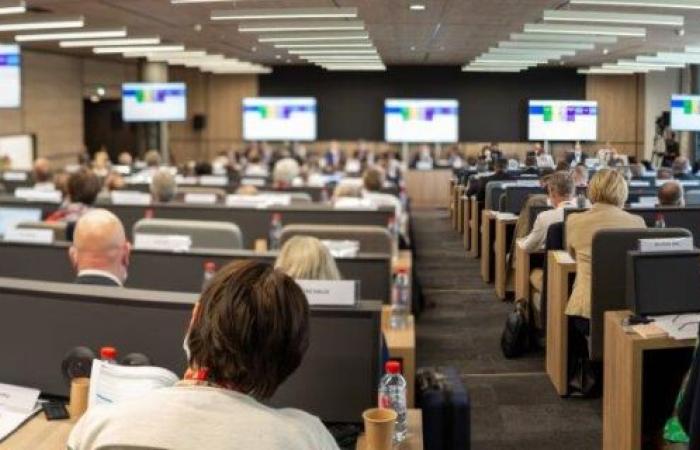
Transports
A decisive step for the metro
The metropolitan council has validated a new essential step to modernize the metro: the order from ALSTOM for 15 52-meter trainsets to equip line 1 and complete the initial project of 27 trainsets (which will be put into service in 2026). Why this acquisition? The network's rolling stock is currently made up of 143 trainsets of three different generations: 38 VAL 206 A (commissioned when line 1 opened in 1983); 45 VAL 206 B BIS (commissioned from 1986); and 60 older generation VAL 208s (commissioned from 1999). The VAL 206 trainsets, in operation for around forty years, will reach the end of their life and will be withdrawn from circulation between 2026 and 2030. The entry into circulation of these 15 52-meter trainsets will then make it possible to switch 27 VAL 208 trainsets (the newest in the fleet) from line 1 to line 2, in order to gradually replace the old equipment on the latter. The contractual delivery schedule provides for the delivery of the first three of these 15 52-meter trainsets in March 2027 for their entry into service on line 1 in December 2027. The fifteenth trainset should be delivered in July 2028. At the same time, the MEL plan on the purchase of additional trains to sustain the operation of line 2 and meet growing user demand. Ultimately, line 1 will operate exclusively with the new 52 meter rolling stock. Amount of the operation: nearly 210 million euros excluding tax.
More info
Urban security
A planned Metropolitan Urban Supervision Center
The MEL continues its commitment alongside the 95 municipalities in its territory to strengthen security and prevent delinquency. Adopted in 2017, its Metropolitan Master Plan for Urban Video Protection (SDMVPU), consolidated in 2021, supports video protection projects through pooling and financing mechanisms. The metropolitan council has taken a new step with the launch, on December 23, of a Call for Expressions of Interest (AMI) which aims to collect, until February 25, the needs of the municipalities, and prefigure the creation of a Metropolitan Center for Urban Supervision (CMSU) with volunteer cities. The proposals for the scope and catalog of services will be studied by the metropolitan council on April 25, 2025. This shared system will allow secure real-time viewing of images from public cameras, while respecting the prerogatives of mayors in the management of local security. . The AMI is structured around two axes: the prefiguration of the CMSU and the strengthening of existing Urban Supervision Centers (CSU) thanks to increased financial support. Since 2018, the MEL has allocated more than 3 million euros to nearly 50 municipalities to support these initiatives. This ambitious project illustrates the MEL's desire to support communities in their security and resource optimization challenges.
More info
Water and sanitation
Fight against rural runoff
The MEL reaffirms its commitment to the adaptation and resilience of its territory in the face of the challenges posed by climate change. Among the priorities displayed, particular attention is paid to the consequences of violent storms and episodes of rural runoff which are hitting our territory more and more frequently. The latter, coming from agricultural or natural land, cause mudslides which flood buildings, degrade sanitation networks and the agronomic quality of the soil, and alter waterways. To respond to these challenges, the MEL supports its municipalities by creating a competition fund intended to finance up to 50% of the expenses incurred by the latter for the implementation of curative works such as buffering basins. This support is conditional on several eligibility criteria: the recent occurrence of floods, impacts on the networks or watercourses managed by the MEL, several buildings affected, the effective implementation of preventive measures (hedges for example ) and an origin of runoff involving several municipalities. This fund, which can be mobilized over the period 2025-2029, will have an envelope of €2,500,000.
More info
Institution
MEL2: a sustainable real estate project
MEL is launching MEL2, a building project intended to bring together, near its Lille headquarters, 690 agents currently working in other sites. Annual savings of €2 million are expected compared to the current situation, since these 690 agents are installed in energy-intensive premises of which the MEL is also a tenant. Designed to meet the requirements of regulations, which impose a reduction in the energy consumption of buildings by 2030, the project aims for exemplary environmental performance: RE 2028 certifications, compliance with the Biosourced Wood pact, and adherence to the Lille Low Carbon approach. . This project marks a key step in the energy transition and sustainable management of the MEL's real estate assets. It embodies both an ecological and economic ambition. This modern 20,000 m² building will include an administrative restaurant, spaces for the MEL's satellite organizations, an underground car park with 200 spaces, and bicycle parking with 130 spaces. Work will begin at the beginning of 2027 for commissioning in 2029. Estimated total cost: €97.6 million.
More info
Energy
MEL accelerates the transition
The adoption of a new master plan for heat and cold networks reinforces metropolitan climate commitments. A heat network (also called a district heating network) is an installation distributing heat produced by one or more centralized boiler rooms to several users, via a set of hot water transport pipes. The heat thus distributed is mainly used for heating buildings and domestic hot water. The heat network is a heating system on an urban scale (as opposed to heating on a building scale, in which heat is produced on site, at the user building or in the immediate vicinity). This new master plan sets ambitious objectives: connecting the equivalent of 130,000 housing units to networks using at least 75% renewable and recovery energy (EnR&R) by 2035 (currently, six metropolitan networks supply 50,000 housing equivalents with 66% RE&R). Among the developments to come, the procedures underway for the extension of the Lille and Wattignies networks to four additional municipalities (Haubourdin, Loos, Marcq-en-Barœul and La Madeleine) and for the creation of a network in Tourcoing. The plan provides for projects for the next ten years to create networks in Seclin and Armentières and to extend the existing networks in Roubaix, Wattrelos and Villeneuve-d'Ascq. It also identifies areas of interest requiring additional studies (Halluin, Roncq, Wasquehal, La Bassée, Ronchin and Faches-Thumesnil). This plan is based on an analysis of energy needs and local resources and on consultation of the stakeholders concerned. It supports the ambition of carbon neutrality by 2050, while offering metropolitan areas cheap, sustainable energy, confirming the MEL as a model for regional energy transition.
More info
Sport
New metropolitan swimming pool at Union
As part of the Swimming Pool Plan 2, the MEL supports the metropolitan swimming pool project carried out by the municipalities of Tourcoing and Roubaix on the Union's “Arena” site. This project, while meeting the needs of the local high-level swimming and waterpolo club (Les Enfants de Neptune Tourcoing-Lille Métropole), also aims to fill the gap in aquatic pools for schools. Located in Union, a certified eco-neighborhood undergoing renewal, this modern facility will include a 50-meter pool, play and learning pools, as well as multi-sport areas. It will also host national and international competitions which will strengthen the influence of the MEL. Thus, this project symbolizes the metropolitan ambition of a sports network serving high-level sport but also residents and territories. Located near the Roubaix canal and a vast urban park, the future facility will constitute a real lever for sustainable development and local dynamism. Feasibility studies are underway, and a financial agreement will define the contributions of the MEL, the main financier, and the municipalities concerned.
More info





